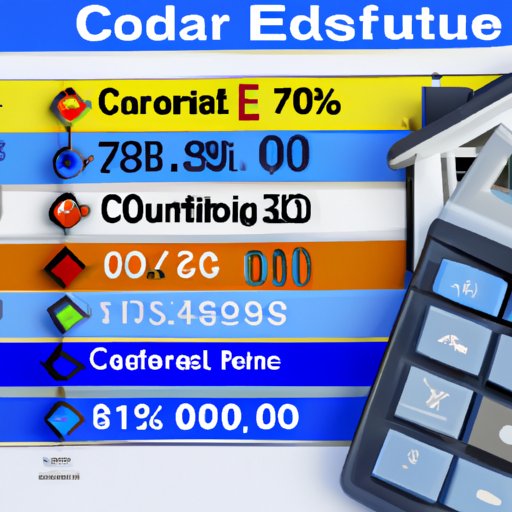Introduction
When it comes to buying a house, one of the most important questions is “how big of a house can I afford?” Before beginning the process of finding your dream home, it’s essential to understand what affordability looks like and how to calculate it. This article will provide an in-depth look at these topics, with step-by-step instructions for determining your maximum home price and factors that can affect affordability.
Calculating Your Maximum Home Price: A Step-by-Step Guide
The first step in understanding how much house you can afford is to estimate your down payment. Typically, lenders suggest putting down 20% of the purchase price. However, there are loan options available that require as little as 3% down. Once you’ve determined your down payment amount, you can begin to calculate your monthly payments.
To calculate your monthly payments, you’ll need to know the interest rate on your loan and the length of the loan. You can use an online calculator to help you estimate these numbers. Additionally, it’s important to factor in closing costs, which generally range from 2-5% of the total cost of the home.
Your credit score is also a key factor in determining your maximum home price. The higher your score, the better interest rates and terms you’ll qualify for, which can significantly reduce your monthly payments. If your credit score is below 680, you may have difficulty getting approved for a loan.
How Much House Can You Afford?
Once you have an idea of your down payment amount and monthly payments, you can start comparing your income and expenses. To determine what you can realistically afford, you should make sure your housing costs don’t exceed 28% of your gross income. This includes your mortgage payment, property taxes, insurance, and any other related costs.
In addition to comparing your income and expenses, it’s important to calculate your debt-to-income (DTI) ratio. This is a measure of your financial health that takes into account all of your debts, including student loans, car payments, credit cards, and more. Generally, lenders prefer to see a DTI ratio of 36% or less.
It’s also important to know when to say no. Even if you’re pre-approved for a loan that would allow you to buy a bigger house than you can afford, it’s best to stick to a budget that will allow you to comfortably pay your bills each month.

Factors Affecting How Much House You Can Afford
In addition to your income and debt, there are several external factors that can affect how much house you can afford. Location is one of the most important factors, as different regions have different average home prices. Additionally, market conditions can play a role in how much you’ll be able to spend; if there are more buyers than sellers, prices tend to be higher.
Interest rates are another important factor to consider. Lower interest rates mean lower monthly payments, so it’s worth shopping around to find the best deal. Finally, it’s important to keep an eye on your credit score, as this can affect the interest rate you qualify for.

How to Determine the Right Size Home for You
Once you’ve calculated your maximum home price, you’ll need to decide on the size of the house you want. Start by assessing your needs. How many bedrooms and bathrooms do you need? Do you plan to entertain often? Do you need space for a home office or craft room? Answering these questions can help you narrow down your search.
Next, look at the features you want. Do you prefer a single-story home or multiple levels? Are you looking for a modern design or a traditional one? Knowing what you’re looking for can help you focus your search.
Finally, establish a budget. Once you’ve considered your needs and wants, set a realistic budget and stick to it. This will help you avoid overspending and ensure that you’re comfortable with your monthly payments.
The Biggest Mistakes People Make When Buying a House
When it comes to buying a house, there are some common mistakes that people make. One of the biggest is not getting pre-approved for a loan before starting their search. This can lead to disappointment if you fall in love with a house only to find out you can’t get approved for the loan.
Another mistake people make is not considering all costs. In addition to your mortgage payment, there are other costs associated with buying a home, such as property taxes, homeowners insurance, and closing costs. Be sure to factor these in when calculating your maximum home price.
Finally, it’s important to shop around. Different lenders offer different interest rates and terms, so it’s worth taking the time to compare your options. This can save you money in the long run.
Conclusion
Knowing how much house you can afford is an essential part of the home-buying process. To determine your maximum home price, it’s important to consider your income, expenses, and debt, as well as external factors such as location, market conditions, and interest rates. Additionally, it’s important to assess your needs, look at the features you want, and establish a budget. Finally, avoid common mistakes such as not getting pre-approved for a loan and not shopping around for the best deal.
Buying a house is a major decision and it’s essential to understand what affordability looks like. With the right information and preparation, you can find a house that meets your needs and fits within your budget.
(Note: Is this article not meeting your expectations? Do you have knowledge or insights to share? Unlock new opportunities and expand your reach by joining our authors team. Click Registration to join us and share your expertise with our readers.)
